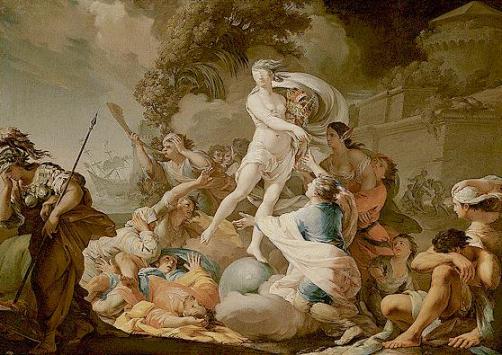“Felicitas’ themes are kindness, charity, love, romance, joy, success and luck. Her symbols are greetings (greeting cards). This Roman Goddess brings happiness, success, and good fortune whenever someone salutes another with good words or amiable deeds. She comes to us today to energize late fall and early winter with the transformational power of kindness.
While Sweetest Day seems to be focused on lovers these days, in earlier years it represented an opportunity to shower anyone and everyone with cheerful trinkets, kind acts, and gentle words to lift people’s spirits. By looking for Felicitas for help, we can return this holiday to its original form and bring joy to people who might otherwise be feeling a case of autumn blues. Look for, or make, some humorous greeting cards to send to folks you know would appreciate the thought. Lay your hands on them and invoke Felicitas’s blessings in any way that feels right.
To improve the effect further, anoint the cards with rejuvenating aromatic oils that match the recipient’s needs (such as pine for money, rose for love or peace, cinnamon for luck, sandalwood for health, and lavender to combat depression). This way, when they open that card, the magic and the aroma will be released together to bless, energize, and bear Felicitas’s greetings along with your heartfelt wishes!”
(Patricia Telesco, “365 Goddess: a daily guide to the magic and inspiration of the goddess”.)
“‘Good fortune’ was a Roman Goddess distinct from Fortuna, another divinity of fate. Shown on Roman coins in the form of a heavyset matron, Felicitas was Goddess of personal happiness, while Fortuna ruled the fates of cities and nations” (Monaghan, p. 124).
Other names and epithets include: Fausta Felicitas, Felicitas Deorum (“Luck of the Gods”), Felicitas Perpetua (“Everlasting Happiness”), Felicitas Republicae (“Fortune of the State”), Felicitas Romanorum (“Success of the Romans”), Felicitas Saeculi (“Happiness of the Age”), or Felicitas Temporum (“Luck of the Times”). [1]
Click here to read a fantastic piece written by Thalia Took on Fausta Felicitas.
In comparing Felicitas and Fortuna, Delia O’Riordan writes: “Despite Her connection with both luck and success, Felicitas was sometimes conflated with the Goddess of Destiny, Fortuna, whose symbol was the Wheel of Fortune which spun until it arbitrarily stopped in a position that would decide the outcome of events. Whereas Felicitas was seen as the particular patroness of military exploits and successful harvests, Fortuna was seen as having a direct and personal effect on the totality of everyone’s life through the working of Destiny. Romans believed that the overall Destiny of a person was somewhat ‘fixed’ from birth but the intervention of Fortune in the form of the unexpected or chance happening could alter that Destiny. In addition, the Roman Gods like the Greeks before them, were notoriously moody and unpredictable. If one inadvertently offended a powerful God or Goddess, their wrath could be epic so it was important to stay on good terms with them all as far as possible. To have Felicitas and Fortuna both on your side was a powerful combination and devotees often honoured both Goddesses in household shrines as well as the temples. In the age of science and technology, we see these ancient deities as archetypes created in consciousness by more primitive minds than ours. But archetypes carry energy and if we don’t learn how to work with those energies, they can influence our decisions and behaviours from within the recesses of our unconscious selves and wreak havoc in our lives in the form of neuroses, addictions, compulsions, etc.” [2]
Sources:
Monaghan, Patricia. The New Book of Goddesses and Heroines, “Felicitas”.
O’Riordan, Delia. Psychic-delia.com, “Spirits Matters: Success and Destiny“.
Took, Thalia. Thaliatook.com, “Fausta Felicitas“.
Suggested Links:
Lunesoleil. Lunesoleil23.wordpress.com, “Les astéroïdes de la #chance avec Fortuna , Félicitas et Tyché” (translated from French).
Roman-colosseum.info, “Roman Gods and Goddesses“.
Wikipedia, “Felicitas“.












